Johan Liebert and The Joker: A Comparison of The Same Character
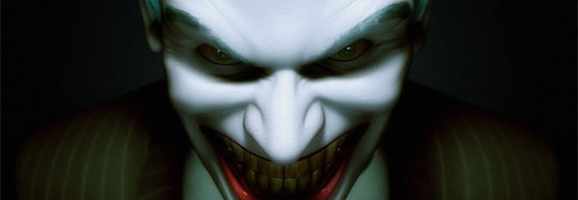
Comic books are a vast art form with a rabid fan-base, so naturally, it is also the type of art form that sparks a lot of debate and discussions over a wide array of questions in relations to characters, powers, morality, etc. Superman is a popular name thrown around when asked who is the most powerful superhero and names like Galactus and Darkseid are valid contenders when asked who is the most powerful villain. But how about who is the most good or the most evil? Strength is not synonymous with morality, so a powerful hero like Superman is not necessarily the most good nor is Galactus the most evil. Morality is a difficult subject to grasp, and the idea that no one is truly evil is a common theme in comic books. One of the most commonly posed questions is “who is the most evil comic book character?” One of the most frequent answers is a name that is infamous not only with comic book fans, but among the general public–The Joker.
The Joker could easily be considered as one of the most iconic characters of all time. He has appeared more frequently in Batman comics than any other villain, he frequently comes in #1 in popular comic villain rankings (IGN put him in second behind Magneto, which I personally don’t agree with), and his many incarnations on television, video games, and the big screen always garner critical acclaim. Many could argue he is as famous as his constant adversary, Batman, and that is because The Joker achieves what is incredibly difficult, or what some can argue is impossible. He is a character of pure evil.
However, as iconic and unique The Joker may seem, on the other side of the globe in Japan, there is a character that is remarkably similar to The Joker, though not as known worldwide. Like The Joker, he is portrayed as a being without compassion and is seen as the face of evil in the series. Finding a character that is similar to The Joker is something noteworthy because of how iconic The Joker is for his unique personality and behavior. This character is a personification of pure evil taken form in a different fictional character, but a character who is identical to the iconic Joker–Johan Liebert.
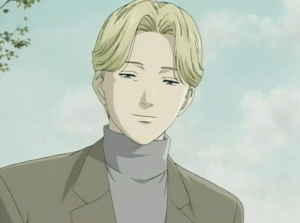
In the brilliant psychological thriller anime, Monster, we follow the protagonist, Dr. Tenma, as he tries to hunt down and kill Johan Liebert, the titular monster of the series. Johan Liebert is the manga version of pure evil, much like The Joker is the comic book version of pure evil. Both these characters have been meticulously designed and written to be seen not only as a villain, but as pure evil. It is only when we put aside the two characters’ drastically different appearances and outward behavior to examine their life, their treatment of humanity, and their inner motivations and strengths do we then realize that Johan and The Joker are the same character.
Origin Story
Why does Hannibal Lecter eat people? For the longest time that was one of the most terrifying mysteries of cinema (until Thomas Harris ruined the illusion by elaborating on Lecter’s back story, which was stupid). The mystery of why he did what he did was what made him so terrifying and enthralling. Johan Liebert and The Joker are the same way. What made them like this? Is this a case of nature vs. nurture? The origin story of both characters are murky at best. In Monster, the mystery of Johan made him more of a force of nature or a god than a man. As the story went on though, we learn more and more about him. We learn he was the result of an orchestrated eugenics experiment, he lived with his mother and sister in Prague, he was separated from his sister for a long time until they were reunited and forced to travel on their own, and then he was taken to the infamous and mysterious Kinderheim 511. However, we never learn if his treatment as a child is what caused him to become the legendary monster, or if he was simply born this way. Certainly by the time he attended Kinderheim 511, he was already at a level that could not be controlled by the staff of the compound. By the time he was 10, he was already a monster.
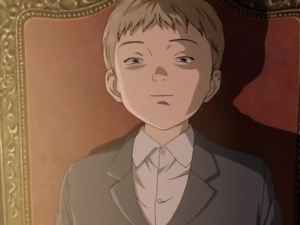
The Joker’s origin is even murkier than Johan’s. Unlike Johan’s back story, which was carefully intertwined with the past of other characters in the series who were still alive and able to fill in the many blanks of Johan’s past, The Joker’s story is completely devoid of any credible witnesses, including The Joker himself. The best thing we have to go on concerning The Joker’s origin story is found in Alan Moore’s comic, The Killing Joke. In this story, we discover that The Joker was originally a failed comedian who got into some shady dealings with the mob. On the day he was to help out certain mob members with a heist, his pregnant wife was killed in a freak accident and the heist he was involved with went south and he fell into a vat of chemicals that permanently altered his appearance. That was the day he went mad. As clear-cut as this story seems, even The Joker admits his past is lost to him. He sometimes remembers it one day and remembers it completely differently the next, which suits him fine because, “If I have a past, I would prefer it to be multiple choice!” So, the origin story we heard in The Killing Joke is by no means fact, and the only thing we can take as truth from this is that The Joker became what he did because of “one bad day.”
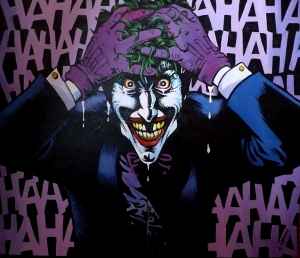
Motivation
In most cases, evil acts always have a motive. Magneto acts as he does because he knows what it is like to be a persecuted minority, and he wants to change that for himself and his people. Light Yagami takes on the role of Kira because he believes he can lead the world to a golden age. However, characters like Johan and The Joker are different. There is no motive for what they do, no method to their madness.
In Monster, throughout his childhood, Johan would kill his foster parents and move on to find another suitable host/victim. Why does he kill them? We have no real insight into his mind, only the minds of those close to him or those who believe they think like him. One of the many murderers who worshiped Johan said that, in Johan’s shoes, he would kill his foster parents because they now bore him. Is this true? It could be or it couldn’t be. It is an educated guess at best, but Johan is not a man who can be compared to others. Maybe that one particular murderer would kill out of boredom, and Johan has exhibited signs of acting out of an interest in someone, but to assume he acts similarly to others is a statement more ludicrous than the idea of killing out of boredom. The best, and most likely, thing that resembles motive that Johan has is his desire to be the last one standing at the end of the world. In addition to the killings of his many foster parents, when he got older and went out of his way to kill someone directly (a rare honor), so much emphasis is put on the absence of presence. Inspector Lunge, the classic “quirky but genius” detective, is a man who is always capable of understanding a killer’s thought process and motive when he examines a crime scene, but even he admits that when dealing with a murder at the hands of Johan, he feels nothing. He senses no motive, no feelings, and no reason behind the slaughter.
The Joker is similar to Johan in this regard. However, unlike Johan, The Joker is quite the chatterbox, so we actually have an idea of why he murders and acts the way he does. Out of amusement. He kills at a whim, and enjoys the thrill of battling with Batman, and he uses murder to get his attention. In the movie, The Dark Knight, he openly admits to Batman that he was bored with ripping off the mob, and that Batman completes him. This relationship he shares with Batman in The Dark Knight and the comics is also the relationship Johan has with his sister, Anna, whom he sees as his other half. While amusement is definitely his primary goal in his murders, he also kills for several other reasons, and keeping up with his image of pure evil, all the reasons are equally insane. In the Death of the Family story arc, possibly the story arc where The Joker is at his most deranged, The Joker returns from a year hiatus after he willing had his face cut off (seriously) and he makes his return in grand fashion by storming the police station and single-handedly kills 19 police officers, all just to serve as his grand return (and to pick up his face, and again, totally serious). In the same story arc, The Joker kills a close friend of Dick Grayson (aka Nightwing) because he dresses as a clown in Grayson’s circus, and there can’t be more than one clown in Gotham. In the comic, Injustice: Gods Among Us, The Joker tricked Superman into murdering Lois Lane, and the death of Lois was the trigger for a massive bomb that destroyed Metropolis. This definitely ranked as one of The Joker’s worst atrocities and largest mass murders, and he only did it because he was tired of playing with Batman and always losing. He decided to “play on easy mode” by challenging Superman.
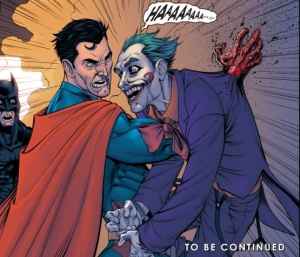
While the motives of The Joker and Johan differ slightly, there is one solid link between Johan and The Joker in regard to their motivation, and that is the senselessness of it all. There is no reason or benefit for them after they kill, which is something people can at least understand. People killing out of jealousy or greed is common, and at some level understandable, but what Johan and The Joker do is inhuman. And this inhumanity is what makes them so appealing to readers. It is easy to create a character of pure good, but pure evil, that is another feat entirely.
Treatment of Victims
“Your failure to understand that there are things much worse than death has always been your greatest weakness.” -Albus Dumbledore
For many, coming up with something worse than death is a challenge, but what Johan and The Joker do their victims goes above and beyond normal behavior and is proof that the death these characters deliver is a blessing after what they do to their victims first. Murder is bad in its own right, but for characters like The Joker and Johan, they don’t simply kill. They toy with their victims and actively try to break them as a human being. The reason behind these particular murders lack any understandable purpose for most people, but for men like Johan and The Joker, these murders have a purpose–to corrupt.
Throughout the Monster series, we learn that Johan has a fascination for fear, and he uses this fear to break people and corrupt them. For example, Johan’s heart-to-heart with a recovering alcoholic ends with the man doubting his own morality and his right to even rekindle a relationship with his estranged daughter, and he begins drinking again and falls to his death. Another time, in what may be the scariest thing Johan has ever done, he manages to convince everyone at his orphanage, adults and children, to slaughter one another by fueling their innermost fears and hatred. While these deaths may have served a purpose in some plan known only to Johan, actively destroying a man’s identity and forcing others to kill one another out of fear, doubt, and hatred was disturbingly cruel. Also, a real page-turner.
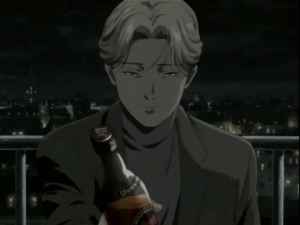
While Johan used his fascination with fear as a way to torture and corrupt certain victims, The Joker is fueled by a different fascination when he is interested enough to toy with his victims, and that is to prove the fragility of “good” and “order”. The Joker has long been associated with chaos, a point made clear in The Dark Knight, where he specifically called himself an, “agent of chaos.” Every extreme case where he took it upon himself to toy with and torture his victims was done as a way to show that most people are just like him. In The Killing Joke, The Joker tried his best to break the mind of Commissioner Gordon, a morally sound individual, in order to prove that a man as morally straight as Gordon is one bad day away from turning out like him. While that example ended in failure, it completely worked in The Dark Knight where he did the same thing to Harvey Dent and in Injustice: Gods Among Us where he did it to Superman.
Charisma
“Have you ever been in the presence of true greatness? I’m not talking about a celebrity of an athlete. I’m talking about someone who changes the world. Someone who history will never forget. So have you? Well, I have, and I’ll tell you something…It’s to die for.” -Harley Quinn
Charisma is one of the traits found in the type of people who change history. Most American presidents have it and even more dictators have it. Also, Johan Liebert and The Joker have it, and appropriately, these were the type of men who could change history. Both these men’s charisma was felt by everyone. Johan is the picture perfect image of a handsome and charismatic young man. Everyone he meets acknowledges him as perfect, and every person he encounters finds him easy to talk to, which he would always use to his advantage. The Joker is the polar opposite to Johan in this regard, but he still has a charisma that no one can ignore. While no one who sees him will ever mistake him as handsome or easy to talk to, they are all in complete awe and terror of his presence. In the Infinite Crisis story-line, the supervillain organization, The Society, didn’t even offer The Joker an invitation to join because they were too scared of his unpredictable personality (He would late kill the leader, Alexander Luthor, Jr., for not including him). Even in a child’s cartoon like Justice League, this charisma is palpable when we see The Joker walks into a room of super-villains, and everyone goes quiet to hear him out, even Lex Luthor. And even despite their drastically different appearances, they both can pull off the girly look.
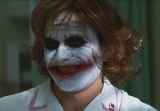
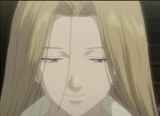
However, charisma is capable of more than making a good first impression. True charisma has the power to control. Both Johan and The Joker have a charisma that reaches out to, and is able to control, certain individuals. In Monster, we get to see many sessions between a psychologist and his criminal subjects in jail. These murderers helped serve to give us a level of insight to Johan, and all these murderers worship Johan and did what he wanted. One of them even killed himself after Johan’s name was mentioned, most likely out of fear that he would hinder Johan in some way. The Joker has the same effect, but on people with unsound minds. In The Dark Knight, Batman tells Harvey Dent that one of the men who shot Gordon was a paranoid schizophrenic and exactly the type of mind that The Joker attracts. However, the best example of The Joker’s control is in Detective Comics #16-17, where we find that a dangerous fascination with The Joker is an actual medical condition, with hundreds of people camping out in a park to protest The Joker’s release and some taking on the mantle of The Joker to commit crimes in his honor. This disorder even affects able-minded and respected people of the community, like the psychiatrists who would treat those afflicted by The Joker’s charisma.
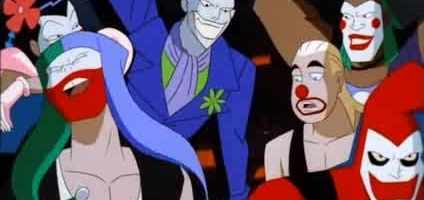
Johan Liebert and The Joker are not perfect matches in everything they do, as their motivations to kill and toy with their victims vary a bit, but at their core, the two characters are the same because of their simplicity. Yes, Johan Liebert and The Joker can be seen as simple, because they are fueled by evil without any of the complexities and moral dilemmas that come from acting decent and good. Also, on top of the reasons already listed, there is another trait the two share that only people who read their stories can understand, and that is the physical effect these fictional characters have over you. The chill that runs down your body when you hear their explanation for the slaughter they orchestrated and the lingering feelings you harbor of these characters that follow you even after sleep is something only characters as terrifyingly off-putting and curiously enthralling like Johan Liebert and The Joker can deliver.
What do you think? Leave a comment.

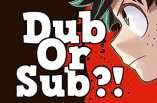
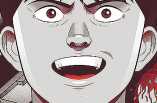

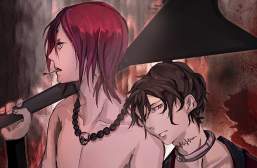

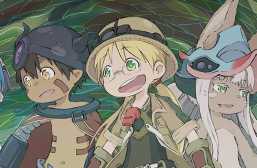
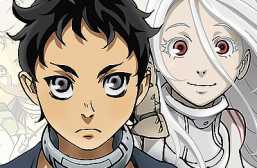
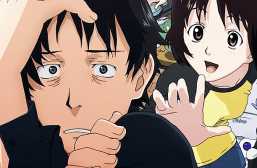
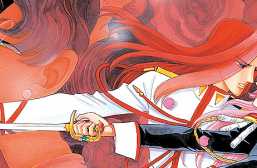
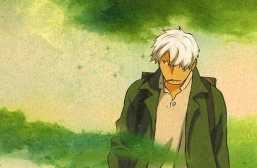
Great analyses. At times, you’re not really sure what Johan, really is. Urasawa leaves you feeling that there’s something supernatural about him, only to remind you later of his human condition.
Best anime ever. I watched all 74 episodes within a month. The only other anime I’ve viewed so intently was Neon Genesis Evangelion. I will say this-go to Veoh and check it out. It stays true to the Manga which is a bonus. You don’t have to be as obsessive as me. In fact take your time, and savor the depth of what it has to offer. I also think it’s a great stepping stone for non anime fans. It has almost none of the stereotypical elements most people associate with anime. In fact you could superimpose the story to live action. Although it works better in the anime format.
I often thought, if there was an anime that could turn into an excellent live action TV-series, it would be this one. Because of how believable the characters are, and how normal they are (they aren’t loud or overreact to everything). I don’t think I could praise this anime enough, in fact I converted two people to like anime because of this series.
I agree and it really is the smartest & cleverest anime out there, I felt smart watching it & understanding everything. But wow it took you only a month to watch them all, it took me a couple months.
I just have to show you up, I actually watched all 74 episodes in the course of two weeks. That’s probably not something I should be proud of, actually I should of taken that to my grave. Anyways Monster isn’t my favorite anime but it is definitely in the top 5.
Which are the other 4 ?
Well written article, the Joker has practically changed the way I view villains, no one compares to how great Ledger performed the Joker. I wish he was alive to be in the third and final movie.
Yeah, there is actually an easy comparison to Ledger’s great performance – Mark Hamill’s Joker from the Animated Series, as well as Arkham Asylum and Arkham City.
Monster is an excellent anime. Probably one of my favourites. I wish more attempts were made to create “real world” dramas like this, or even well produced dramas in general. The only other serious anime I become so hooked on was Death Note. IMO DN blows Monster out of the water.
I think Monster could have been my favourite if it wasn’t for two points. Firstly, it’s a common complaint with many english dubbed animes. The voice acting was terrible! It seemed to me most of the time the actors had no idea what emotion or pacing was needed for their dialogue. More than once I had to question whether or not people actually got paid for this. If I had produced the english voice-overs I would have demanded my money back.
Secondly, the exposition was ridiculous! I can’t believe how many times characters repeated themselves over and over and everytime it happened everyone else looked like the speaker had just dropped a bombshell. No one in this entire series had a single thought they didn’t immediately vocalize. Seriously, less is more often times.
Both characters are wonderfully written.
I’m going to have to question your interpretation of the Joker. He and Johan are similar, no question, but in your interpretation you use the word, “evil”. I believe this is a misuse of terms in the Joker’s case. Yes without question he is a villain but, only because of his nature as an agent of chaos. In the more realistic imaginings of him this element of him has sometimes been muted but, a consensus of Joker’s character can be agreed upon. He as a character has no endgame. Unlike Johan who may be senseless but still holds some semblance of a plan, Joker’s mode of operation is infinite in nature. Murder, even on a massive scale, is more of a means to draw in Batman rather than a act that leads to him on top. In later interpretations his relationship with Batman is toyed with but, no matter the media, Joker is shown consistently to want an unending battle with Batman and only Batman.
I’m writing a paper for my college English class on how villains, like the Joker, express the very secret internal desires of society. I might source parts of this, thank you.
I’ve always found definitions of evil as a fascinating subject. It seems like, outside of fiction, there are very few purely evil individuals throughout history. I say that because I think you have to differentiate people who are clinically insane (to the point that they don’t understand the wrongness of their actions – sociopaths and most serial killers) and people who are motivated by potentially good intentions (such as preserving social order, or protecting/rebuilding their home/country).
Although both Johan and the Joker clearly would be diagnosed as extreme sociopaths (and psychopaths, in the Joker’s case) – what I think is so fascinating about the Joker is that he clearly recognizes that other people see his actions as morally reprehensible – and he loves it. This is what I think defines true evil – and I think in a lot of ways villains like these are so satisfying because we don’t really find them in history. Villains as pure and evil as the Joker provide us a mechanism for digesting and processing the villains in real life, who are always more complicated and nuanced.
It’s kind of crazy to think it, but the fact that the Joker is SUCH a two dimensional character is actually a positive – it’s what makes his meaning to us so complex and compelling.
Where other ordinary “clichéd” villains tend to commit some really evil acts because they want to gain something of “value” (or something considered “good”) such as wealth or power (political or similar). E.G. Any villains with the megalomania complex (wanting to control everyone and everything, and rule the world with an iron fist))
The Joker and Johan Liebert are good examples of the opposite.
speaking about heinous villains, check out the character ‘Moriarty’ as depicted in the sherlock tv show… straying in a lot of ways from the conventional Prof. Moriarty that appears in the novels, this personae is just brilliantly insane!
Monster is by far one of the best modern portrayals of sociopathy. Johan Liebert is such a complex character and raises the controversies of nature vs. nurture. Though he commits heinous deeds which I don’t condone, I did feel a certain empathy towards him for how he was treated early on. The way he was dehumanized with not having a name and being treated as an experiment is chilling and Urasawa makes him more fascinating, arguably than even the protagonist. But as you mentioned, he does have a sort of affection for his twin and the doctor who saved his life, in a twisted way of course.
Johan is very intelligent, charming, and beautifully handsome, while being very manipulative, sociopathic, and on multiple occasions is referred to as “the devil.” However, while the character description may seem derivative on paper at first glance, by the end of the series, the character’s portrayal establishes Johan as a distinct and terrifying in his own right, and whose actions are so convincingly sinister-so chilling-that his soft, level voice is enough to make you fear him as much as his victims do. One of the greatest villains.
Like the Joker, Liebert’s part in the series resembles that of a Vole operating underground; we mostly get to hear about him as a legend rather than witness him in action.
The scariest monsters are the ones we cannot see.
I’ve got some anime to watch..
I strongly disagree with your analysis.
Johan is as sharp a character as it can be. His motivations and origins might be a mistery at the beginning, but by the end of the series they are completely clear.
Johan’s character was born the moment his mother chose his sister over him.
That moment when you are chosen over your twin sister, almost identical to you in every sense, by no particular reason. Pure rejection into nothingness without any reason. Pure solitude.
Johan is a deep psychological investigation into complete oblivion. He seeks it for himself as he seeks it for others. The Monster without a Name.
Johan does not kill you. He makes your death become irrelevant to everyone, including yourself.
He is a psychological surgeon (pun intended).
The Joker, on the other hand, is a character that is all over the place. He is pure chaos.
He has no plan, he is like a child playing. Nothing like Johan.
The beauty of Monster is that it works on a symbolic level as well as a realistic one. In the realistic sense, Johan cannot come to terms with his mother’s choice because he does not know whether it was incidental or intentional. The confusion is doubled by his uncertainty over whether Anna/Viera was protecting the child she was holding on to, or damning it, for she, too, was removed from Tri Zaba after Anna was sent to the Red Rose Mansion.
I don’t think Johan’s intentions are clear; my own interpretation is close to yours, although I think that rather than complete oblivion, he seeks first and foremost to undo his existence so that Bonaparta’s experiment is rendered moot. It is the mother’s curse on Bonaparta come to fruition, and applying it unilaterally to everyone he encounters is, I believe, a product of the Kinderheim experiments and other instances, where he learns, very early on in his life, how cruel humanity can be.
I take some issue with the author’s perception of Johan as evil. The entire series is about deconstructing the concept of evil and fighting to find forgiveness even when grief and loss are overwhelming. By choosing Johan, by saving his life once more, Tenma reverses what the mother did – he makes a conscious choice for Johan, for the monstrous – but not evil – human being that he is.
Hi Dennis
I’m only just watching Monster… I have 10 episodes to go, so I gave your article a full read. It is fantastic!! Well done!! I hope you have another article in the works soon. 🙂 I am interested to see what you will write next! peace.
I am 15 episodes into this show. Interesting thus far but the main character is very melodramatic, shockingly so at points.
Johan just wanted to create the perfect suicide.
No idea if this is even relevant now but I just want to say while I love the analysis presented I personally disagree that Joker and Johan are the same character. Every villain, every bad guy or antagonist in any story or comic or tv show I’ve ever read or seen has human qualities. the “I’m doing this for the right reason” attitude of Light Yagami and Walter White. The bully that is Frieza and half the other superpowered shallow villains. Then there’s Joker. Joker is pure chaos and anarchy, a being that exists to show the Batman and the rest of the world that the “rules” don’t make any sense. And yet, he’s still human. There’s a particular moment in the Killing Joke, where Batman offers Joker a fresh start, and Joker THINKS ABOUT IT. Because he knows that what he has done, what he is doing, is evil and wrong. the only exception to this rule, the only villain i have ever seen that seems like a supernatural being from a different dimension, is Johan. Are there human traits about him? Yes, otherwise he’d be a really boring character. but they almost seem..fake, or made up. there’s a reason why I strongly believe Johan would tear apart any character he’d come face to face with. Because he’s surpassed humanity. He’s not the “perfect child” the neonazis think he is, he’s MORE. He’s beyond human comprehension, that is why he can only be described as a monster. People can argue about his motives or whether he’s pure evil or not, but the fact is that he can break anyone and anything. Joker is a great character, but he’s still a man, he still has human traits. He’s nothing like Johan, not in the slightest.
Well… i went through all the 74 episodes in two weekends. Not very proud, but also glad i did it, since its an absolutely incredible anime.
Since i didnt allowed myself much time to digest all the information, as i breezed from one episode to the next one, my take on Johan is that he became the Monster Anna was supposed to be. Anna was destined to be the real Monster, until Bonaparta fell in love with her mother, realized his mistake and saved Anna by telling her “she shouldnt become a monster”.
As Johan never really had the chance to develope his own identity while being dressed as a girl, he internalized everything that happenned to Anna at the mansion (along with those horrible books he read) and so he became Anna´s Monster: the terrible personality Anna should have had manifested in all its pure evil in Johan. Add to the mix the fact that he was already a genius, and Little help from Kindeheim 501 courses in sociopathy and there you have it.
Johan himself calls Anna his other half, and proof of Anna´s monster can be seen when she gets hypnotized by doctor Gillen.
Indeed Johan planned killings as he always thinks that he must be the last standing man as the world ends. That’s the motivation throughout Johan’s Evilness.
Johan Lieber is different from the joker in the sense that he a has split personality, and thus is only partially evil. He said in the anime that he has two personalities, one who tries to prevent murder, one that tries to stop it. (see villainwiki) The drugged interview on tape, the picturebook, in the movie are things reminiscent of monarch programming, which is a fictional (rumored to be real) process used to split peoples personalities, and to create alters, alternative personalities in people by severely traumatizing them and teaching them things in drugged states. Monach programming is done to for example create murderous personalities in people who are otherwise not murderous. The alts and the original personality may or may not become aware of
eachother. In monarch programming, the switching of alts can be triggered by using certain words/situations/images. One alt may take over the person.
Grimmers ‘other one’ Steiner is also an alter. He is triggered by situation in which grimmer in a serious danger.
I believe that one of the reasons that Dr Tenma saved Johan is that when he became aware that kinderheim used monarch program, he realized that Johans evil
personality was an alter. (and that thus the process could be reverted)
Johan isnt as evil as the joker, only his alter is.
please remove the first comment it has typos
Johan Lieber is different from the joker in the sense that he a has split personality, and thus is only partially evil. He said in the anime that he has two personalities, one who tries to prevent murder, one that tries to stop it. (see villainwiki) The drugged interview on tape, the picturebook, in the movie are things reminiscent of monarch programming, which is a fictional (rumored to be real) process used to split peoples personalities, and to create alters, alternative personalities in people by severely traumatizing them and teaching them things in drugged states. Monach programming is done to for example create murderous personalities in people who are otherwise not murderous. The alts and the original personality may or may not become aware of
eachother. In monarch programming, the switching of alts can be triggered by using certain words/situations/images. One alt may take over the person.
Grimmers ‘other one’ Steiner is also an alter. He is triggered by situation in which grimmer in a serious danger.
I believe that one of the reasons that Dr Tenma saved Johan is that when he became aware that kinderheim used monarch program, he realized that Johans evil personality was an alter. (and that thus the process could be reverted)
Johan isnt as evil as the joker, only his alter is.
Nigga, watch the “Joker” movie
very good person : buddha :: joker: johan…considering both in the same world i think joker would follow johan like roberto…..read another monster (interview of lunge)….joker went evil bcauz life became out of control…but johan wasn’t like that…read the interview part of lunge….u would get a very good psychological analysis and a clear difference between johan and joker
Astute analysis. Although I kinda feel that Johan Liebert has the ability to freak out even the Joker if they were to ever confront each other. Johan’s nihilism is on a whole different level, it’s inhuman.